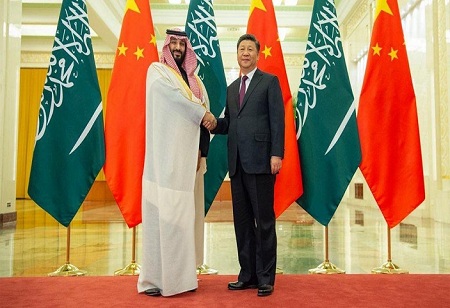Saudi Arabia's Ministry of Education has requested the country's public and private secondary schools to offer Chinese language lessons twice a week as the country's connections with China strengthen. According to the Saudi Gazette, schools were urged to set aside for Chinese education. During Saudi Crown Prince and Prime Minister Mohammed bin Salman Al Saud's visit to Beijing in 2019, an agreement was reached to incorporate the Chinese language into the curriculum at all levels of education in Saudi schools and universities. During President Xi Jinping's state visit to Saudi Arabia last December, leaders from the two nations signed an agreement on educational cooperation. According to the agreement, the Chinese Ministry of Education's Center for Language Education and Cooperation would send Chinese language teaching professionals to Saudi Arabia to prepare the syllabus, train local instructors, and organize Chinese language competence examinations. According to experts, the tighter interaction and rising trade and economic links between China and Arab countries in recent years have strengthened the region's popularity of the Chinese language. In July 2022, a contender competes in the "Chinese Bridge" for university students in Riyadh, Saudi Arabia. significant incentives would be given to the finest Chinese students. According to the report, the top 16 male and female Chinese students in Saudi Arabia would be recognized by the country's Education Ministry. According to Mohammed Asiri, an associate professor of international commercial law at King Abdulaziz University in Jeddah, Saudi Arabia is China's greatest trading partner in the Middle East and Africa, and China is the top buyer of Saudi oil. According to him, Chinese enterprises have increased their investment in Saudi Arabia because they see the Kingdom as a promising environment based on its Vision 2030 program. Experts predict that now that Saudi Arabia, Iran, and the United Arab Emirates have been asked to join the BRICS, there will be more desire among people in these countries to study Chinese, which will provide a window into China's rich history and rapid progress.
According to Liu Li, president of Beijing Language and Culture University, the university has around 8,000 students from Arab nations. According to Liu, more than 800 instructors, students, and professionals from Arab nations are participating in academic exchanges at the institution. According to Hou Yuxiang, head of the School of Middle Eastern Studies at Beijing International Studies University, Saudi Arabia's series of actions on teaching Chinese demonstrate the country's commitment to fostering strong bilateral relations. Saudi Arabia has nine colleges that provide Chinese language degrees, and the nation has produced more than 300 local Chinese language instructors, according to him. Meanwhile, Iran has stated that Chinese would be included in its national education system beginning in 2024, and Chinese is taught in 158 public schools in the UAE, according to Hou. While the Chinese language is becoming increasingly prevalent in educational curricula across the world, this tendency is particularly noticeable in Arab nations, according to Hou. This is based on traditionally cordial relations between China and the area, as well as the successful outcomes of current economic, cultural, commercial, and security cooperation, he added. According to Hou, the Chinese language was incorporated into the national education systems of the UAE, Saudi Arabia, Egypt, and Tunisia by the end of last year, and 16 Arab nations had started Chinese language majors at their institutions. "More Arab students have discovered a "They are understanding and promoting Chinese culture in a more accurate and rational way through learning the Chinese language," he continued. This has encouraged not just formal contact between China and the Arab area, but also people-to-people encounters and collaboration among young people on both sides, according to Hou.

